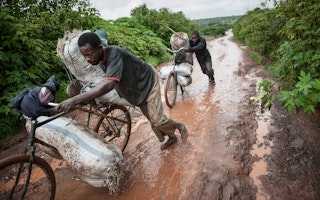The existing legal framework in Montenegro does not provide sufficient protection from gender-based discrimination in the labor market, according to this OSI Network Women's Program report. Likewise protection of women's human rights is still very far from being either a well-known concept or practice, the only exception being a recent criminal code recodification recognizing family violence. There is still a great deal of work to be done in terms of gender equity legislation and its enforcement, including awareness raising vis-à-vis the principles of equality between women and men.
Montenegro is a country where traditional societal roles and gender stereotypes continue to persist, yet the government has taken steps in the right direction. Preparatory work has commenced to draft several legal texts related to equal treatment, reflecting an intention on the part of the government to fulfill and implement the standards required by EU integration.
This report is one of a seven-part series, "On the Road to the EU," prepared as part of the OSI Network Women’s Program's “Bringing the EU Home” Project. This three-year project aims to promote awareness, advocacy, and enforcement of equal opportunity legislation at the national level and to build the capacity of national actors in civil society to use EU-level gender equality mechanisms effectively. The project further aims to help increase the importance of equal opportunities on the European agenda.
An assessment of the status of equal opportunities between women and men, de jure and de facto, was carried out in seven South Eastern European entities: Albania, Bosnia, Croatia, Kosovo, Macedonia, Montenegro, and Serbia. The reports were prepared in cooperation with the International Gender Policy Network.
The complete Montenegro report, as well as a fact sheet addressing the specific situation of Romani women, are available for download.
Read more
Resilience in Moldova
Q&A: Moldova’s Path to a European Future

Moldova has endured the Kremlin’s aggression because it has chosen to leave Russia's sphere of influence and supports Ukraine. The impact of the war on daily life—and why the nation is determined to join the EU.
Rethinking the EU
In an Age of Crisis, an Opportunity to Remake the EU

From climate change to rising authoritarianism, Europe is facing a range of crises that threaten the way we live. The EU must seize the opportunity to reshape how it works and rethink what role it plays in a changing world.
Corporate Responsibility
Q&A: Why (Some) Investors Want More Regulation

As the EU works on rules to protect worker rights and the planet from corporate harm, Open Society’s Jon Jacoby spoke to Anita Dorett, of the Investor Alliance for Human Rights, about how investors are pushing for change.
